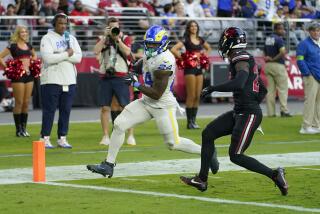Orville L. Freeman, 84; U.S. Secretary of Agriculture Under Kennedy, Johnson
- Share via
Orville L. Freeman, U.S. secretary of agriculture under Presidents Kennedy and Johnson and a three-term governor of Minnesota, died of complications from Alzheimer’s disease Thursday night in Minneapolis. He was 84.
Freeman was among a generation of Democratic politicians from Minnesota, including Vice President Hubert H. Humphrey and U.S. Sen. Eugene McCarthy, to achieve national prominence in their political careers.
“He was a dynamic governor,” said Hubert H. Humphrey III, son of the late vice president. “He really helped Minnesota come out of that war period and move into the modern era.”
Born in Minneapolis, Freeman played football at the University of Minnesota.
While an undergraduate, he was asked by Humphrey to join him in a debating team. They proved a strong duo, winning national honors, and forged a friendship that would last decades.
Freeman was a Phi Beta Kappa honors student and graduated magna cum laude in 1941.
Freeman left the University of Minnesota law school before the Japanese attack on Pearl Harbor to join the Marines.
He served in the South Pacific, and was badly wounded when he was hit in the face by a sniper’s bullet while leading a patrol on Bougainville Island. His wounds required extensive rehabilitation and forced him to learn to speak again.
After recovering, he was transferred to Washington, D.C., where, for the remainder of the war, he directed rehabilitation programs for the Marine Corps.
Set on continuing his education, Freeman returned to the University of Minnesota law school and began a career in local politics working for Humphrey, who was then mayor of Minneapolis. He would later manage Humphrey’s successful campaign for U.S. Senate in 1948.
After unsuccessful runs for state attorney general in 1950 and governor in 1952, Freeman ran for governor again in 1954 and was a surprise winner.
He was just 36, and the first member of the Democratic-Farmer Labor Party to win the post. In doing so, he ended 17 years of Republican administration. Freeman was reelected in 1956 and 1958.
As governor, Freeman encouraged civil rights -- appointing Minnesota’s first black judge -- and fair employment practices.
He also helped the career of Walter Mondale, another leading name in Minnesota Democratic politics, by appointing him state attorney general in 1959.
Freeman actively campaigned for Sen. John F. Kennedy in his run for the presidency against Richard Nixon in 1960.
Freeman nominated Kennedy for the presidency at the Democratic Convention in Los Angeles. A Lutheran, Freeman later defended Kennedy in his home state against anti-Catholic bigotry.
But while Kennedy won the presidency and narrowly carried Minnesota, Freeman lost his reelection bid.
He said, however, that he thought the loss was tied more to his efforts to end a difficult meatpacking strike in Minnesota by calling in the National Guard to keep strikebreakers from entering a plant to take union jobs.
At the urging of Humphrey, Kennedy named Freeman agriculture secretary soon after taking office.
As secretary, Freeman encouraged Kennedy to launch the Food Stamp program, which became the first executive order the president signed. Freeman also proposed school breakfast and lunch programs for needy children.
Freeman also encouraged the use of the abundant U.S. food supply to feed hungry people and eliminate starvation and malnutrition abroad. One of his first efforts to that end was to organize a massive program to ship U.S. grain to India in 1962.
During his term as secretary, which lasted until 1969, U.S. food exports expanded dramatically and government surpluses fell.
After leaving government service, Freeman moved to New York City to become chief executive of Business International, a company that provides marketing intelligence to U.S. corporations.
In 1985, he returned to Washington to lead the Agriculture Council of America, a group working to improve farm exports.
Freeman also practiced law.
Ten years later, he returned to Minneapolis to work on his memoirs. He also was a visiting scholar at the Humphrey Institute of Public Affairs at the University of Minnesota.
He is survived by his wife of 61 years, Jane; a son, Michael of Minneapolis; a daughter, Constance of Nairobi, Kenya; and three grandchildren. Memorial services are pending.
More to Read
Sign up for Essential California
The most important California stories and recommendations in your inbox every morning.
You may occasionally receive promotional content from the Los Angeles Times.













